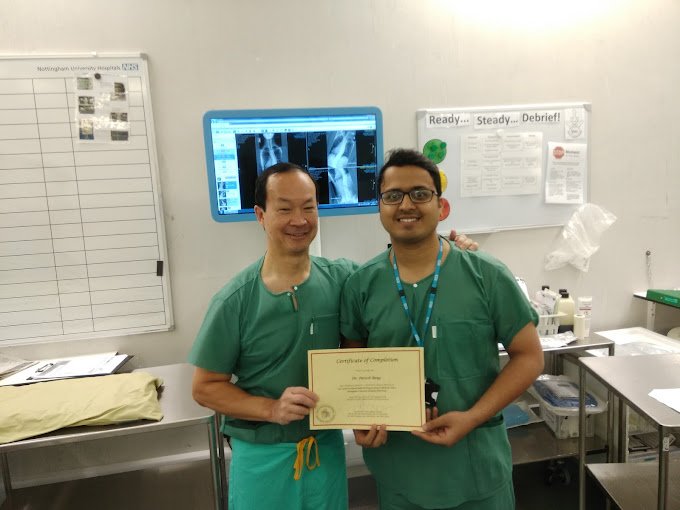Dr. Paresh Bang | Matruchhaya Spine Clinic
Meet Our Doctor
Dr. Paresh Bang
Consultant Spine Surgeon

Slip Disc Specialist In Chandrapur

Slip Disc Specialist
A slip disc specialist, often referred to as a spinal or orthopedic surgeon with expertise in spinal disorders, treats conditions related to herniated discs, commonly called “slip discs.” A slipped or herniated disc occurs when one of the soft cushions (discs) between the vertebrae in the spine bulges out, pressing on surrounding nerves and causing pain, numbness, or weakness.
They are also prescribed anti-inflammatory medications like non-steroidal anti-inflammatory medications or spinal epidural injections to relieve troubling symptoms. It is best to consult the specialist for a proper diagnosis of the condition and treatment options.
Role of a Slip Disc Specialist
Diagnosis
Physical Examination: The specialist assesses your symptoms, such as pain, tingling, or weakness, which often radiate to other parts of the body (e.g., legs or arms depending on the location of the herniated disc).
Imaging: They may order diagnostic tests like X-rays, MRI scans, or CT scans to visualize the affected disc and determine the severity of the herniation.
Non-Surgical Treatment
Physical Therapy: Exercise regimens and stretches designed to relieve pressure on the herniated disc and strengthen the muscles around the spine.
Medications: Anti-inflammatory medications, pain relievers, or muscle relaxants may be prescribed to manage symptoms.
Epidural Injections: Steroid injections around the spinal nerves can help reduce inflammation and pain in severe cases.
Rest and Activity Modification: Modifying physical activity to avoid movements that aggravate the condition is a common recommendation.
Surgical Treatment
Surgery: is usually considered if conservative treatments fail after several weeks or if there is severe pain, nerve damage, or loss of bowel/bladder control (which could indicate a medical emergency called cauda equina syndrome).
Microdiscectomy: A common minimally invasive surgery where part of the herniated disc is removed to relieve pressure on the nerve.
Disc Replacement: In some cases, a specialist might replace the damaged disc with an artificial one, especially in younger, active patients.
Postoperative Care
Rehabilitation: After surgery, a slip disc specialist will coordinate with physical therapists to guide you through recovery, including exercises to restore mobility, strength, and flexibility.
Pain Management: They provide a plan to manage pain post-surgery, which may include medications and physical therapy.
Symptoms of a Slipped Disc
The symptoms may vary as per the position of a herniated disc and the size of the herniation. A patient may feel slight pain or no pain if the slipped disc doesn’t press a nerve. However, some common symptoms are:
- Neck pain: A sharp pain is experienced in between shoulder blades and neck. The pain aggravates with sudden movements or uncomfortable position.
- Numbness: Many people with slipped discs feel a tingling sensation or numbness in the areas closer to affected nerves.
- Weakness: Muscles near the affected nerves weaken and make patients stumble or prone to accidents.
- Leg pain: A patient may feel intense pain in the leg (thigh, buttocks, and calf) if a herniated disc is within the lower back.
Treatment
Conservative treatment helps in modifying daily activities for avoiding movements, which cause pain. This way, a patient’s symptoms can be relieved within a few days or weeks.
- Medications: Over-the-counter pain medications: For mild to moderate pain, the doctor may prescribe over-the-counter pain medication like naproxen sodium (Aleve), ibuprofen (Advil, Mortin IB, etc.) and acetaminophen (Tylenol, others).
- Muscle relaxers: It can be prescribed to patients if they experience muscle spasms.
- Cortisone injections: If the patient’s pain does not improve with oral medicines, corticosteroid injections are prescribed to be injected into the area near the spinal nerves.
- Opioids: Due to the significant side effects of opioids, as well as their potential for addiction, most doctors avoid prescribing them for slip disc treatment.
- Therapy: A doctor may even suggest undergoing physical therapy to relieve the pain. With the help of physical therapists, patients are taught specific exercises and positions to reduce the pain of the slip disc.
- Surgery: Some people with slip discs may need surgical treatment. A doctor may suggest surgery in case the conservative treatment fails to relieve specific symptoms after a few weeks, especially if a patient continues to experience:
- Difficulty in walking or standing
- Poorly controlled pain
- Weakness or numbness
- Bowel control or loss of bladder
Choosing a Slip Disc Specialist
- Experience:
- Look for a doctor with expertise in treating herniated discs, particularly with a track record of successful outcomes.
- Check if the specialist is board-certified in orthopedic surgery, neurosurgery, or pain management.
- Conservative vs. Surgical Approach:
- Some specialists focus on non-surgical treatments, while others are surgeons. It’s important to consult with a specialist who can offer a broad range of options and only recommend surgery if necessary.
- Hospital Affiliation:
- Choose a specialist affiliated with a reputable hospital or spine center, as they will have access to the latest technology and comprehensive care.
- Patient Reviews and Testimonials:
- Research the specialist’s patient reviews to understand their success rates and patient satisfaction.
When to See a Specialist
You should see a slip disc specialist if:
- Your symptoms have not improved with rest, physical therapy, or medication.
- You experience significant pain, numbness, or weakness in your legs or arms.
- You have difficulty controlling your bladder or bowels, which may indicate a more serious condition like cauda equina syndrome.Contact Us
Risk Factors Associated with Slip Disc
- Gender: Men usually have a higher risk of slip disc as compared to women.
- Age: It is the most common risk factor that occurs in people between the ages -35 to 50.
- Family history: Slip disc is even considered to have a hereditary tendency in a family line. Physically demanding work, such as heavy lifting, pushing or pulling actions, could injure the disc.
- Obesity: Overweight makes a person 12 times more likely to get a slip disc after a microdiscectomy surgery.Visit Our Hospital
